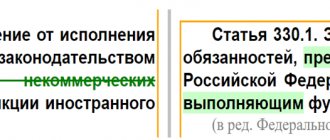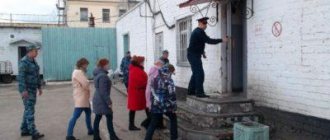1. Escape from a place of deprivation of liberty, from arrest or from custody, committed by a person serving a sentence or in pre-trial detention, -
shall be punishable by forced labor for a term of up to four years or imprisonment for the same term.
2. The same act, committed by a group of persons by prior conspiracy or by an organized group, -
shall be punishable by forced labor for a term of up to five years or imprisonment for the same term.
3. Acts provided for in parts one or two of this article, committed with the use of violence dangerous to life or health, or with the threat of such violence, as well as with the use of weapons or objects used as weapons, -
shall be punishable by forced labor for a term of up to five years or imprisonment for a term of up to eight years.
- Article 312. Illegal actions in relation to property subject to inventory or seizure or subject to confiscation
- Article 314. Evasion from serving restriction of freedom, imprisonment, as well as from the application of compulsory measures of a medical nature
Commentary to Art. 313 of the Criminal Code of the Russian Federation
The main object of the crime is the interests of justice in the field of execution of court decisions. An additional object is the normal activity of places of confinement, arrest, and detention. If the escape was accompanied by the signs specified in Part 3 of Art. 313 of the Criminal Code of the Russian Federation, then human health also acts as an additional object.
The social danger of escape lies in the fact that the serving of a sentence by a person sentenced to imprisonment is interrupted, which counteracts the execution of a court sentence, the execution of a court decision on choosing a preventive measure in the form of detention in relation to a suspect or accused is interrupted, and a preliminary investigation is made difficult or impossible. and judicial consideration of the case, if the person is in custody as a preventive measure, i.e. harm to the interests of justice. In addition, the activities of a correctional institution or law enforcement agency are disorganized to a certain extent due to the diversion of forces and resources to search and detain a fugitive, creating the danger that this person will commit a new crime, and creating doubt among the population about the ability of specially created bodies to ensure reliable isolation of criminals from society.
The objective side of the crime provided for in Part 1 of Art. 313 of the Criminal Code of the Russian Federation, consists of escaping from a place of imprisonment, from arrest or from custody.
Places of deprivation of liberty are institutions in which those sentenced to imprisonment serve their sentences. In accordance with Part 1 of Art. 73 of the Penal Code of the Russian Federation, those sentenced to imprisonment serve their sentences in correctional institutions.
According to Part 1 of Art. 74 of the Penal Code of the Russian Federation, correctional institutions are correctional colonies, educational colonies, prisons, and medical correctional institutions. Pre-trial detention centers perform the functions of correctional institutions in relation to convicts left to perform household maintenance work, as well as in relation to convicts sentenced for a period of not more than six months, left in pre-trial detention centers with their consent.
Correctional colonies are divided into settlement colonies, general-regime correctional colonies, high-security correctional colonies, and special-regime correctional colonies (Part 2 of Article 74 of the Penal Code of the Russian Federation).
In accordance with Part 1 of Art. 77 of the Penal Code of the Russian Federation, in exceptional cases, persons sentenced for the first time to imprisonment for a term of not more than five years, who are assigned to serve their sentence in a general regime correctional colony, may, with their consent, be left in a pre-trial detention center or prison to perform household maintenance work.
Currently, arrest as a form of punishment has not been introduced.
The legislator in Art. 313 of the Criminal Code of the Russian Federation establishes criminal liability for violation of the requirements of a court conviction.
When escaping from custody, the matter must be a violation of the requirements of a judicial act on the selection of a preventive measure.
Places of detention of suspects and accused in accordance with Art. 7 of the Federal Law of July 15, 1995 N 103-FZ “On the detention of suspects and accused of committing crimes” are:
———————————
NW RF. 1995. N 29. Art. 2759.
— pre-trial detention centers of the penal system;
— temporary detention centers for suspects and accused of internal affairs bodies;
— temporary detention centers for suspects and accused border agencies of the Federal Security Service.
In cases provided for by this Federal Law, places of detention of suspects and accused may be institutions of the penal system that carry out criminal punishment in the form of imprisonment, and guardhouses.
In cases where detention on suspicion of committing a crime is carried out in accordance with the Code of Criminal Procedure of the Russian Federation by captains of sea vessels on long voyages, or by the heads of wintering quarters during the absence of transport connections with wintering quarters, the suspects are kept in premises that are determined by the specified officials and are adapted for these purposes. goals.
In accordance with Part 1 of Art. 10 of the Federal Law of July 15, 1995 N 103-FZ, convicts serving sentences in correctional institutions, detained on suspicion of committing another crime, may be kept in custody in these institutions, but in isolation from convicts serving their sentences.
Suspects and accused persons, in respect of whom detention in custody has been chosen as a preventive measure, may be kept in prisons or on the territories of institutions executing punishments, in premises specially equipped for these purposes, functioning as pre-trial detention centers (Part 2 of Article 10 of the Federal Law dated July 15, 1995 N 103-FZ). The list of correctional institutions in the territories of which suspects and accused may be held is approved by the Minister of Justice of the Russian Federation in agreement with the Prosecutor General of the Russian Federation.
———————————
Order of the Ministry of Justice of Russia dated June 30, 1999 N 212 “On approval of the List of correctional institutions in the territories of which premises operating as pre-trial detention centers have been created” (as amended) // Bulletin of the Ministry of Justice of the Russian Federation. 1999. N 7.
Suspects and defendants in respect of whom detention in custody has been chosen as a preventive measure, in the case of an examination ordered on the grounds provided for by the Code of Criminal Procedure of the Russian Federation, as well as in the case of providing them with medical assistance, are placed in medical institutions (Part 3 of Article 10 of the Federal Law of 15 July 1995 N 103-FZ).
———————————
Order of the Ministry of Internal Affairs of Russia and the Ministry of Health of Russia dated December 31, 1999 N 1115/475 “On approval of the Instruction on the procedure for medical and sanitary provision of persons held in temporary detention centers of internal affairs bodies” // BNA of the Russian Federation. 2000. N 11.
Suspected and accused military personnel are kept in guardhouses (Article 11 of the Federal Law of July 15, 1995 N 103-FZ).
The place of detention of suspects or accused in respect of whom detention has been chosen as a preventive measure is also the premises in the preliminary investigation bodies (office of the investigator, the person conducting the inquiry), the courtroom, vehicles used for transportation to the place of departure punishment, to court, etc., as well as any other institutions where a person is under escort when carrying out investigative actions. The place of detention is also considered to be the place where investigative actions are carried out, for example, when examining a crime scene or conducting an investigative experiment.
The moment of detention occurs simultaneously with the announcement to the person of the application of this preventive measure to him.
Escape is understood as unauthorized illegal (contrary to the law, without the permission of competent officials) leaving a place of imprisonment or a place of detention or custody by a person serving a sentence or being in custody or under arrest.
Escape can only be accomplished as a result of active actions. This could be digging, breaking a wall, sawing bars, escaping from guards, etc. There are cases of receiving forged documents in places of deprivation of liberty, releasing convicts from serving their sentences. Such “release” of a convicted person is also an escape. There are cases of escapes accomplished by bribing the administration of places of detention or pre-trial detention centers.
Escape can only be made from the places indicated in the disposition of the commented article. The crime scene in this composition is a mandatory sign of the objective party.
An escape from a dormitory outside a correctional institution, from a work site, or along the route to it of a person who was allowed to travel without an escort or escort is considered committed from a place of deprivation of liberty. At the same time, evasion from the prescribed route of a person sentenced to imprisonment, who is allowed to travel without an escort, is not an escape if this is done without the purpose of evading serving a sentence. Such actions are recognized as a violation of the regime of the correctional institution and entail disciplinary liability.
Escape from a place of deprivation of liberty will also be illegal unauthorized leaving of the place of a long meeting outside the correctional institution. Failure to return from a vacation spent outside a correctional institution does not constitute the crime in question, since there are no signs of escape such as unauthorized, illegal leaving of the place of deprivation of liberty. In this case, leaving the correctional institution is carried out legally. If permission to travel outside the place of confinement during vacation was obtained fraudulently, failure to return should be considered an escape.
By design, escape refers to crimes with a formal composition and is considered completed from the moment of: 1) crossing the outer perimeter of a place of deprivation of liberty (for example, a general regime correctional colony) or a place of detention (for example, a pre-trial detention center or a temporary detention center), if the escape is complete from the territory of such places; 2) complete loss of control over the escort by the convoy, if the escape was made during the convoy process outside the specified places, in other words, when the subject will be able, at his own discretion, to change locations, come into contact with other persons, etc.
Judicial practice also proceeds from the fact that from the moment the security is overcome, the crime is considered completed.
———————————
See: Bulletin of the Supreme Court of the RSFSR. 1965. N 10. P. 11 (R.’s case).
Taking into account the specific conditions of serving a sentence in penal colonies, the moment of completion of escape from them is determined differently. In accordance with Art. 129 of the Penal Code of the Russian Federation in colony settlements, those sentenced to imprisonment during the hours from waking up to lights out have the right to free movement within the colony settlement. In these cases, the moment of the end of the escape will be the moment of unauthorized abandonment of the territory of the colony-settlement. In addition, with the permission of the administration of the colony-settlement, convicts can move without supervision outside the colony-settlement, but within the territory of the corresponding administrative-territorial entity. An escape committed under such conditions will be completed from the moment of illegally leaving the territory of the administrative-territorial entity.
Escape from places of imprisonment, pre-trial detention and from custody is a continuing crime. It ends with the arrest of the perpetrator or his confession. Recognition of escape as a continuing crime affects the calculation of the statute of limitations (Article 83 of the Criminal Code of the Russian Federation), as well as the application of an amnesty (Article 84 of the Criminal Code of the Russian Federation). The statute of limitations at the time of escape is interrupted and resumed only after the arrest of the fugitive or his surrender. An amnesty can be applied to such persons (if it applies to a given person) only if the person was detained or turned himself in before the issuance of the amnesty decree (unless otherwise specified in the text of the amnesty itself).
———————————
In Art. 13 Resolution of the Supreme Court of the Russian Federation dated June 18, 1992 N 3075-1 (as amended on November 13, 1992) “On amnesty” (Gazette of the Supreme Court of the Russian Federation. 1992. N 47. Art. 2671) indicated that persons Those who escaped from places of imprisonment or from custody, who appeared within a month from the date of publication of the amnesty act to the police or the place where they served their sentence, are exempt from liability for escape or evasion from serving their sentence.
In the literature, two moments of the end of an escape are distinguished: legal - from the moment of leaving the place of deprivation of liberty and actual - from the moment of surrender, detention, death of the perpetrator, changes in the criminal law that decriminalizes the act or reduces the punishment to the one actually served, from the moment of issuing an act of amnesty or pardon. The calculation of the statute of limitations for criminal prosecution for escape begins from the moment the crime actually ends.
———————————
See: Criminal law. Special part: Textbook. for universities / Rep. ed. AND I. Kozachenko, Z.A. Neznamova, G.P. Novoselov. M., 2000. S. 653 - 654.
Thus, we can conclude that the corpus delicti of the crime in question is completed from the moment of leaving the place of deprivation of liberty or the complete loss of control over the escort by the convoy.
A crime, as a socially dangerous act, will be completed as a result of the action of the culprit himself, aimed at stopping the crime, or the occurrence of events that prevent the commission of the crime (for example, the intervention of authorities).
The subjective side of the crime is characterized by direct intent. The person is aware that a preventive measure has been chosen for him in the form of detention, or he has been detained on suspicion of committing a crime, or has been sentenced to imprisonment or arrest. His consciousness also embraces the fact that he is leaving this place without permission, and desires it.
Considering issues of judicial practice in cases of escapes, the Plenum of the Supreme Court of the Russian Federation in Resolution No. 1 of March 19, 1975 “On judicial practice of considering materials on the transfer of convicts to forced labor colonies-settlements and criminal cases on escapes from these colonies” indicated the following : “When considering cases of escapes from penal colonies, courts must take into account the peculiarities of the detention regime in such colonies (lack of barriers, security, etc.), and therefore, in each case, especially carefully examine the actual circumstances of the convict’s unauthorized abandonment of this colony, motives, reasons and conditions that prompted him to commit such an act, and, based on the totality of all the collected evidence, as well as personal data, decide whether his actions contained a crime under Art. 313 of the Criminal Code of the Russian Federation or Art. 314 of the Criminal Code of the Russian Federation. Do not allow facts of conviction for actions that only formally contain signs of escape or evasion from serving the sentence of a convicted person who is allowed a short-term exit from places of deprivation of liberty, but in essence constitute violations of the established procedure for serving a sentence, liability for which is provided for in Art. 115 of the Penal Code of the Russian Federation."
The special subject of the crime in question is a person who has reached the age of sixteen: a) sentenced to punishment in the form of imprisonment or arrest; b) in respect of whom a preventive measure has been chosen - detention (Article 108 of the Code of Criminal Procedure of the Russian Federation); c) detained as a person suspected of committing a crime (Article 91 of the Code of Criminal Procedure of the Russian Federation).
Minors aged fourteen to sixteen years for escaping from an educational colony or from custody are liable under Art. 313 of the Criminal Code of the Russian Federation is not covered.
Persons subjected to administrative arrest as a measure of administrative punishment (Article 3.9 of the Code of Administrative Offenses of the Russian Federation), those subjected to administrative detention on the basis of Art. 27.3 Code of Administrative Offenses of the Russian Federation. In the literature, there is a point of view that persons who were illegally convicted or those for whom a preventive measure was chosen illegally do not belong to the subjects.
———————————
See, in particular: Criminal law. Special part: Textbook. for universities / Rep. ed. AND I. Kozachenko, Z.A. Neznamova, G.P. Novoselov. M., 2000. S. 653 - 654; Criminal law. Special part: Textbook. / Under the general ed. IN AND. Radchenko. M., 2004. P. 570.
Since the law does not indicate the legality of detention and in places of deprivation of liberty, escape cannot be an act of necessary defense (Article 37 of the Criminal Code of the Russian Federation) from illegal actions of the justice authorities, since there is an appropriate legal toolkit for resolving this legal conflict - the procedure appealing a judicial act. The issue of ensuring the right to personal safety cannot be resolved by escaping. If a threat to personal safety arises, convicts have the right to contact any official of the place of deprivation of liberty or arrest house with a request to ensure personal safety, which obliges these officials to immediately take the necessary measures to protect convicts from the impending danger (Article 13 of the Penal Code of the Russian Federation). Consequently, escape as a circumstance of extreme necessity (Article 39 of the Criminal Code of the Russian Federation) is unacceptable.
———————————
At the same time, it should be noted that in practice there are court decisions that speak of the factor of the legality of detention in places of deprivation of liberty as a mandatory condition for escaping. See: Review of the judicial practice of the Supreme Court of the Russian Federation on the consideration of criminal cases in cassation and supervisory procedures in 1995 // Bulletin of the Supreme Court of the Russian Federation. 1996. N 8.











